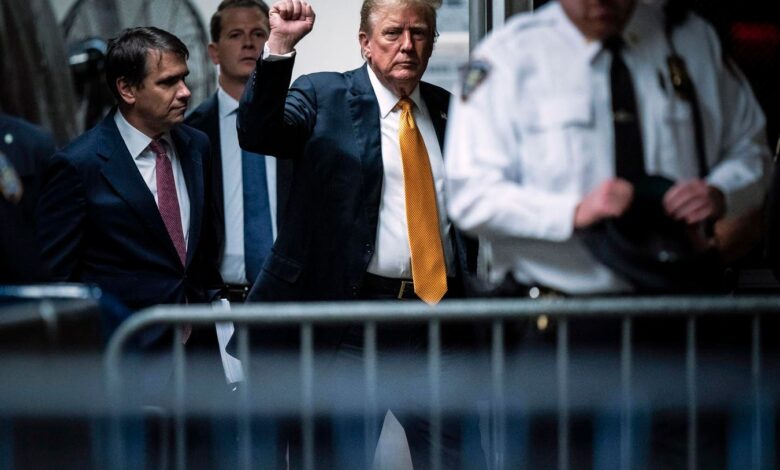Trump Hush Money Trial: Verdict Near As Jury Starts Deliberations

Topline
Jurors won’t decide whether former President Donald Trump should be criminally convicted on 34 counts of falsifying business records until Thursday at the earliest, as the jury was dismissed for the day Wednesday without reaching a verdict, after deliberations began that morning.
Former President Donald Trump raises his fist as he arrives for his criminal trial at Manhattan … [+] Criminal Court on May 29 in New York City.
Key Facts
Jurors started deliberating at approximately 11:30 a.m. Eastern time Wednesday after Judge Juan Merchan delivered the jury instructions, following closing arguments on Tuesday that stretched into the evening hours.
They were then excused for the day just after 4 p.m., after requesting to hear testimony and jury instructions again, without reaching a verdict in the case.
Merchan instructed the jury to base their verdict based only on the evidence and not on any personal biases, and they must find there’s proof beyond a reasonable doubt that Trump falsified business records as a way to cover up efforts to “conspire to promote or prevent the election of any person to a public office by unlawful means”—which makes the falsifying of records a felony, rather than a misdemeanor.
Trump has been indicted on 34 felony counts of falsifying business records based on reimbursement checks he sent to ex-attorney Michael Cohen in 2017, after Cohen paid adult film star Stormy Daniels $130,000 right before the 2016 election to silence her allegations of an affair with Trump (which the ex-president has denied).
Trump’s lawyers have sought to discredit Cohen, who testified Trump was aware of both the payment to Daniels and the reimbursement scheme, with attorney Todd Blanche decrying him in closing arguments as “the MVP of liars” and claiming Cohen “told [jurors] a number of things from the witness stand that were lies.”
Prosecutors countered that argument on Tuesday, telling jurors there’s corroborating phone records and other evidence to back up Cohen’s testimony and arguing that Trump hired Cohen specifically “for the same qualities that his attorneys now urge you to reject his testimony because of”—namely that he would “lie and cheat on Mr. Trump’s behalf.”
What We Don’t Know
How long it will take the jury to deliberate. Court watchers cited by Politico Wednesday speculated a decision will come sooner rather than later—by the end of the week at the latest. But ultimately it’s still too early to say when there could be a verdict or what the jury will do, and jurors can take as long as they need.
Surprising Fact
While court is in session, parties in the case—including Trump—can’t leave the courthouse during the jury’s deliberations until there’s a verdict, Merchan told the parties, according to CNN. Trump not being allowed to leave the courthouse is “unusual,” attorney Mitchell Epner told Forbes in an email, noting that in the case of most criminal defendants, they’re allowed to leave but must “remain close enough to the courthouse that he could be in the courtroom promptly” if there’s a verdict. Trump being forced to remain in the building “may have to do with the security measures necessary to get the former President in and out of the courthouse,” Epner speculated.
What To Watch For
The jury will decide to either acquit or convict Trump on some or all of the charges, or the case could end in a hung jury if they can’t reach a unanimous decision. If Trump’s convicted, the charges against him are each punishable by a fine of up to $5,000 per offense and/or up to four years in prison. That means Trump faces up to $170,000 in fines and 136 years in prison if he were convicted on every count—though legal experts believe it would be unlikely, but not unheard of, for Trump to go to prison as a first-time offender.
Chief Critic
Trump, who has pleaded not guilty to the charges against him, railed against the case in a series of Truth Social posts before proceedings began on Wednesday, decrying the so-called “KANGAROO COURT” and the length of prosecutors’ closing arguments and exclaiming about his hush money deal with Daniels, “NDA’s ARE TOTALLY LEGAL AND ACCEPTED!” The ex-president did not make any comments to reporters before he entered the courtroom, as he typically does.
Key Background
Trump’s Manhattan trial marks the first of the ex-president’s four criminal cases to go to trial, and the first time a former or sitting president has been tried on criminal charges. He was indicted in March 2023 following a yearslong investigation, with prosecutors alleging he falsified records by falsely labeling his reimbursement checks to Cohen as being for legal services. Trump has pleaded not guilty and his attorneys have maintained his innocence in court, arguing the checks for Cohen were for his legal work for the then-president and were thus correctly labeled. Cohen served as the trial’s key witness, spending four days on the stand as he testified Trump personally approved his payment to Daniels and was present during a meeting in which then-Trump Organization CFO Allen Weisselberg told Cohen the reimbursement checks would be labeled as being for legal services. The jury’s deliberations come after Trump has also already been punished during the trial for violating a gag order that bars him from speaking about witnesses, jurors and others involved with the case, with Merchan ordering him to pay $1,000 for each of his ten violations.
Further Reading
ForbesHere’s What Happens If Trump Is Convicted-As Trial Goes To Jury Next WeekBy Alison Durkee



